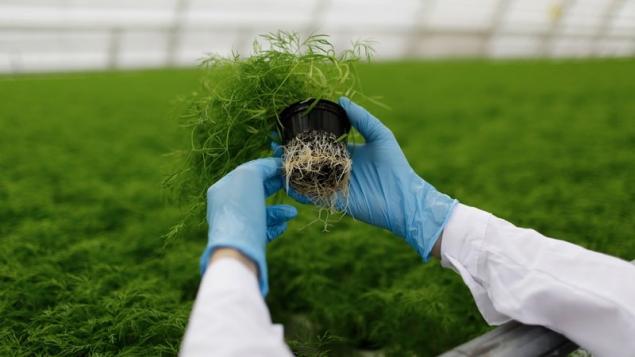290
GMOs have been recognized as beneficial for people and agriculture. So said the Italian scientists.
Genetically modified organism A living organism whose genotype has been artificially altered by genetic engineering. By modifying genes, it is possible to grow a plant with properties it has never possessed. Since the 1970s, scientists around the world have been studying the potential risks of using GMOs. After all, you probably fearfully pass by the counters with huge apples or tomatoes.

DepositPhotos
We have been taught all our lives that GM foods are harmful to health and future offspring. What myths and horror stories were not told to us on TV programs! But Italian scientists have said that GM corn, for example, is healthier than conventional corn.
Editorial "Site" It will tell you why scientists have come to the conclusion that GM foods are useful. Maybe we were really just intimidated.

After analyzing scientific articles published from 1996 to 2016 on crops, grain quality, effects on humans, animals, insects and soils where genetically modified crops were grown, Italian scientists came to an important conclusion: GM plants are more beneficial than harmful. For both the consumer and the manufacturer. The study was published in the authoritative scientific journal Scientific Reports.

Genetically modified corn gives an average of 20% more yield, contains a third less mycotoxins - toxic products of fungi. The life of insects that live in corn fields, but do not harm crops, genetic modification of plants do not affect. But it affects the target parasites. There is also a plus for the environment: the biomass of GM plants decomposes faster, which positively affects the fertility of land on which the same corn grows.

A consumer of GM grain in the face of a person or animal is less likely to be poisoned by mycotoxins. In addition, their reduced content makes production cheaper, as the use of GM crops reduces the cost of cleaning grains from toxins.

Such a statement benefits American researchers have also done so. This applies not only to grain but also to other foods. The analysis of the articles was conducted for two years by a committee of 50 scientists, researchers and specialists in the field of agriculture and biotechnology, and the results were published on May 17, 2016. According to the results of the study, hundreds of scientific papers found no signs of a negative impact of products from GM crops on human health.

DepositPhotos
The use of products from GM crops is not related to cancer, obesity, diabetes, gastrointestinal and kidney diseases, autism and allergies. There was no long-term increase in the incidence of GM food in the US and Canada in the 90s.

DepositPhotos
The gene code of meat or fruit cannot affect a person’s genes. To our stomachs, it is just food that will somehow break down into amino acids, no matter how genetically modified it may be. The important thing is that all the genes that are embedded in GM organisms somehow exist in nature. Scientists do not invent anything from scratch. They simply take a gene from one organism and embed it in another, or alter a naturally occurring gene with a pair of mutations.

DepositPhotos
In addition, a positive effect of GMOs on human health was found due to the reduction of insecticide poisoning and an increase in the level of vitamins in the body. The most common myth about GMOs that artificial genes will penetrate into the wild has also proved groundless. Yes, this process is possible, but no adverse effects of gene transfer have been found.

DepositPhotos
But not all GMOs are aimed at making life easier for producers. For example, a special variety of rice has been developed in which an increased amount of vitamin A is produced. Genetic engineering is actively used in medicine, whether it is GM bacteria that produce insulin, or modified immune cells equipped with special receptors to search for and destroy cancer cells.

DepositPhotos
It's great if GM foods are actually good for you. And the hype around them is just a misconception, which is actively used by food manufacturers who promote their products with the mark “GMO-free”. This is already a well-working marketing move.
What do you think of products labeled GMOs? Tell us in the comments, and also share the research of scientists with your friends in social networks!
Photo by depositphotos preview.

DepositPhotos
We have been taught all our lives that GM foods are harmful to health and future offspring. What myths and horror stories were not told to us on TV programs! But Italian scientists have said that GM corn, for example, is healthier than conventional corn.
Editorial "Site" It will tell you why scientists have come to the conclusion that GM foods are useful. Maybe we were really just intimidated.

After analyzing scientific articles published from 1996 to 2016 on crops, grain quality, effects on humans, animals, insects and soils where genetically modified crops were grown, Italian scientists came to an important conclusion: GM plants are more beneficial than harmful. For both the consumer and the manufacturer. The study was published in the authoritative scientific journal Scientific Reports.

Genetically modified corn gives an average of 20% more yield, contains a third less mycotoxins - toxic products of fungi. The life of insects that live in corn fields, but do not harm crops, genetic modification of plants do not affect. But it affects the target parasites. There is also a plus for the environment: the biomass of GM plants decomposes faster, which positively affects the fertility of land on which the same corn grows.

A consumer of GM grain in the face of a person or animal is less likely to be poisoned by mycotoxins. In addition, their reduced content makes production cheaper, as the use of GM crops reduces the cost of cleaning grains from toxins.

Such a statement benefits American researchers have also done so. This applies not only to grain but also to other foods. The analysis of the articles was conducted for two years by a committee of 50 scientists, researchers and specialists in the field of agriculture and biotechnology, and the results were published on May 17, 2016. According to the results of the study, hundreds of scientific papers found no signs of a negative impact of products from GM crops on human health.

DepositPhotos
The use of products from GM crops is not related to cancer, obesity, diabetes, gastrointestinal and kidney diseases, autism and allergies. There was no long-term increase in the incidence of GM food in the US and Canada in the 90s.

DepositPhotos
The gene code of meat or fruit cannot affect a person’s genes. To our stomachs, it is just food that will somehow break down into amino acids, no matter how genetically modified it may be. The important thing is that all the genes that are embedded in GM organisms somehow exist in nature. Scientists do not invent anything from scratch. They simply take a gene from one organism and embed it in another, or alter a naturally occurring gene with a pair of mutations.

DepositPhotos
In addition, a positive effect of GMOs on human health was found due to the reduction of insecticide poisoning and an increase in the level of vitamins in the body. The most common myth about GMOs that artificial genes will penetrate into the wild has also proved groundless. Yes, this process is possible, but no adverse effects of gene transfer have been found.

DepositPhotos
But not all GMOs are aimed at making life easier for producers. For example, a special variety of rice has been developed in which an increased amount of vitamin A is produced. Genetic engineering is actively used in medicine, whether it is GM bacteria that produce insulin, or modified immune cells equipped with special receptors to search for and destroy cancer cells.

DepositPhotos
It's great if GM foods are actually good for you. And the hype around them is just a misconception, which is actively used by food manufacturers who promote their products with the mark “GMO-free”. This is already a well-working marketing move.
What do you think of products labeled GMOs? Tell us in the comments, and also share the research of scientists with your friends in social networks!
Photo by depositphotos preview.
Greek goddesses in the zodiac sign
Angelina Jolie is the worst example. Here’s who really needs to be tested by genetics.






















